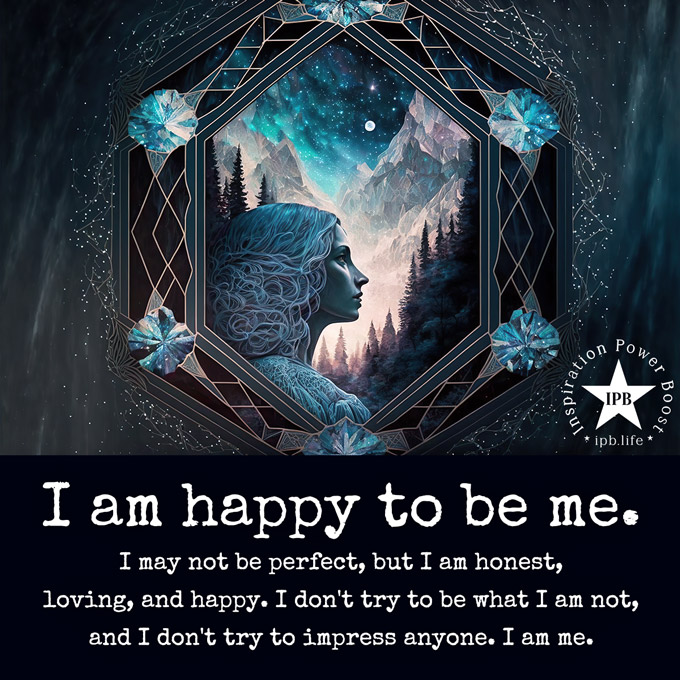
Graphic © InspirationPowerBoost.com (with permission)
“I am happy to be me.
I may not be perfect,
but I am honest, loving, and happy.
I don’t try to be what I am not,
and I don’t try to impress anyone.
I am me.”
Embracing Authenticity and Self-Love
In a world that often pressures individuals to conform to societal norms and ideals, the quote emphasizes the importance of self-acceptance and authenticity. It’s a celebration of individuality, urging us to embrace our imperfections and cherish our unique qualities. By choosing to be genuine and not seeking validation from external sources, we find true happiness and contentment. This quote serves as a reminder that the key to a fulfilling life lies in being true to oneself and valuing the love and honesty that define our character.
The Power of Authenticity
The essence of this quote is not just about self-acceptance but also about the strength that comes from being genuine. Authenticity is a powerful trait that allows individuals to connect deeply with others, build trust, and lead with integrity. By not trying to be something we’re not or seeking to impress others, we allow our true selves to shine through. This authenticity becomes our strength, enabling us to navigate life’s challenges with grace and confidence.
Historical Anecdote: The Tale of The Emperor’s New Clothes
Hans Christian Andersen’s tale, “The Emperor’s New Clothes,” serves as a timeless reminder of the importance of authenticity. In the story, two swindlers convince an emperor that they’ve made him a set of invisible clothes, visible only to the wise. The emperor, not wanting to appear foolish, pretends to see the non-existent garments and parades around the town naked. It’s only when a child points out the obvious that the emperor realizes his folly. This tale underscores the dangers of pretense and the value of seeing and accepting things as they truly are.
Hans Christian Andersen, born in 1805 in Odense, Denmark, is one of the world’s most celebrated storytellers, renowned for his enchanting fairy tales. Growing up in humble circumstances, Andersen’s vivid imagination and love for storytelling became his escape from the challenges of his early life. As an adult, he penned a plethora of tales, many of which, like “The Little Mermaid,” “The Ugly Duckling,” and “The Snow Queen,” have become timeless classics. While his stories often contained fantastical elements, they also touched upon deep human emotions, societal norms, and moral lessons. Throughout his life, Andersen’s unique narrative style and ability to weave magic into the mundane earned him international acclaim, solidifying his legacy as a master of the fairy tale genre.
Daily Affirmation
“I embrace my true self, with all its imperfections and strengths. I am loved, valued, and cherished for who I truly am.”
Further Inspirational Quotes
“To be yourself in a world that is constantly trying to make you something else is the greatest accomplishment.” – Ralph Waldo Emerson
“Always be a first-rate version of yourself, instead of a second-rate version of somebody else.” – Judy Garland
“The more you try to impress, the more you become depressed, and the more they get used to you being you, the more they are impressed.” – Robert J. Braathe
😳 What Tinnitus Does To Your Brain Cells (And How To Stop It)
After 47 years of studies and countless brain scans done on more than 2,400 tinnitus patients, scientists at the MIT Institute found that in a shocking 96% of cases, tinnitus was actually shrinking their brain cells.
As it turns out, tinnitus and brain health are strongly linked.
Even more interesting: The reason why top army officials are not deaf after decades of hearing machine guns, bombs going off and helicopter noises…
Is because they are using something called "the wire method", a simple protocol inspired by a classified surgery on deaf people from the 1950s...
★ How To Get Rid Of Nail Fungus:
★ Does Your Salad Contain This Vegetable?
★ Top 10 Most Valuable Medicinal Herbs:





